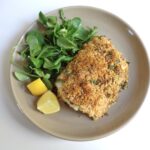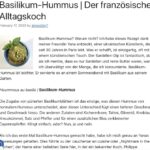 This fish dish with a crusty topping is extremely popular in France and a breeze to make. The topping ‘à la bordelaise‘ — literally Bordeaux style — combines breadcrumbs, shallots, garlic, parsley, salt, pepper, olive oil, lemon and a splash of white wine. Cod or hake are often used, but in fact any white-fleshed fish is fine. The upshot is a sophisticated French take on breaded fish. But does this family friendly dish actually hail from Bordeaux?
This fish dish with a crusty topping is extremely popular in France and a breeze to make. The topping ‘à la bordelaise‘ — literally Bordeaux style — combines breadcrumbs, shallots, garlic, parsley, salt, pepper, olive oil, lemon and a splash of white wine. Cod or hake are often used, but in fact any white-fleshed fish is fine. The upshot is a sophisticated French take on breaded fish. But does this family friendly dish actually hail from Bordeaux?
Poisson à la bordelaise / Crusted fish ‘bordelaise’
The amusing answer, mes amis, is not at all. According to Papilles & Pupilles, a well-regarded French cooking site, the dish was the invention of an employee working in the kitchens of the Findus frozen food company at Boulogne-sur-Mer, which lies on the northern coast of France just south of Calais, about 500 miles from Bordeaux. This was back in 1966. The company was seeking to expand its line of fish dishes and named it ‘à la bordelaise‘ for marketing purposes, to make it sound like authentic country cooking.
So France first discovered poisson à la bordelaise in the frozen food aisles of its supermarkets. Soon children across the country were being served poisson à la bordelaise in their school cafeterias. This history was provided to Papilles & Pupilles by a reader named Renaud who said that the dish evoked such strong culinary memories for him that it was almost like Proust’s madeleine. It wasn’t long before home cooks started making the dish, with results distinctly superior to the premade frozen variety.
The name is not too much of a stretch since ‘bordelaise‘ is applied to a wide range of dishes that have in common the use of shallots and wine. One such is entrecôte bordelaise, or pan-seared steak with shallots. The most classic fish dish prepared à la bordelaise is — wait for it — lamprey, in which the once popular eel-like fish is cooked in red wine and its own blood. You will not be finding that recipe on this site…
Meantime here in Paris I’ve been dealing with more cauchemars en cuisine (nightmares in the kitchen). First my stove imploded just before nightfall while I was busy preparing dinner for six. What turned out to be a fault in the wiring shorted out the electricity in half of the house, including the kitchen. It’s a gas stove — only the spark that lights the burners was electric — so I got out the matches and finished cooking the dinner. By candlelight…
As the stove was kaput I had to buy a new one — and discovered to my dismay that no stoves with gas burners and a gas oven were available in Paris due to supply chain issues linked to the war in Ukraine. The new stove (gas burners, electric oven) is less than ideal. Among other issues the grates over the burners have spaces so wide that my little Italian coffee pot falls through the gap. Cauchemar!
 Then I discovered thanks to ‘pingbacks’ that my site was being pirated. It wasn’t the first time this has happened, but after I posted my last recipe, for basil hummus, there were two such pingbacks, one of which led to a site that had translated my post into German (see screenshot at right).
Then I discovered thanks to ‘pingbacks’ that my site was being pirated. It wasn’t the first time this has happened, but after I posted my last recipe, for basil hummus, there were two such pingbacks, one of which led to a site that had translated my post into German (see screenshot at right).
The second one led to a site in English, road2france.com, which had published a version that must have been translated into some other language and then back into English because it cited ‘The On a Regular Basis French Chef’ (!), changed ‘the first time’ to ‘the primary time’, et cetera. (Unfortunately I neglected to take a screenshot, and they have now taken down the post.) In each case I wrote to the site to complain. I got a reply only from road2france, which said that all the news on their site was ‘automatically uploaded from Google’. I wrote back to ask what that meant, but they didn’t reply.
This is the kind of thing that can drive a blogger crazy. I enjoy writing this blog, but many hours of work go into each post — choosing a recipe, shopping for the ingredients, cooking the dish (sometimes more than once), taking the photo, researching the history of the dish, writing up the recipe and writing the post that goes with it.
 Meantime the people who pirate my site are publishing ads, which I decided from the outset not to do in order to keep the site reader friendly — although I am solicited several times each week by people wanting to advertise or publish sponsored content on my site. Thus the pirates are not just committing theft of intellectual property but also making money from my work, and there doesn’t seem to be anything I can do about it. If anyone has a recipe for putting an end to this situation, please let me know. Nonetheless…
Meantime the people who pirate my site are publishing ads, which I decided from the outset not to do in order to keep the site reader friendly — although I am solicited several times each week by people wanting to advertise or publish sponsored content on my site. Thus the pirates are not just committing theft of intellectual property but also making money from my work, and there doesn’t seem to be anything I can do about it. If anyone has a recipe for putting an end to this situation, please let me know. Nonetheless…
Happy cooking.





Que cela a l’air bon !!!
Dites-nous quand vous l’aurez essayé !
Not far from us, in the village of Lavagnac near Bordeaux, they have an eel festival every year. So far, I’ve not been tempted.
Just the thought of it gives me shivers!
We made this with snapper, delish! I was happy the lemon was subtle, lovely balance of flavors, and nice moist fish.
Glad you enjoyed! And it sounds wonderful with snapper — a fish that’s unfortunately not available here in France…
I am so sorry you are having to go through this mess with your site being pirated. Please keep blogging though.
Lenita, many thanks for your support. The pirates are truly a problem, but not to worry. I don’t anticipate ending the blog anytime soon. Cheers, Meg
Lampry as a food? I remember catching those ugly things in Lake Michigan when the smelt were running. Cannot imagine eating them.
Jodell, I agree. They are bloodsuckers! Who would want to eat that? Nonetheless, ‘lamproie à la bordelaise’ was considered a delicacy over here in years gone by…